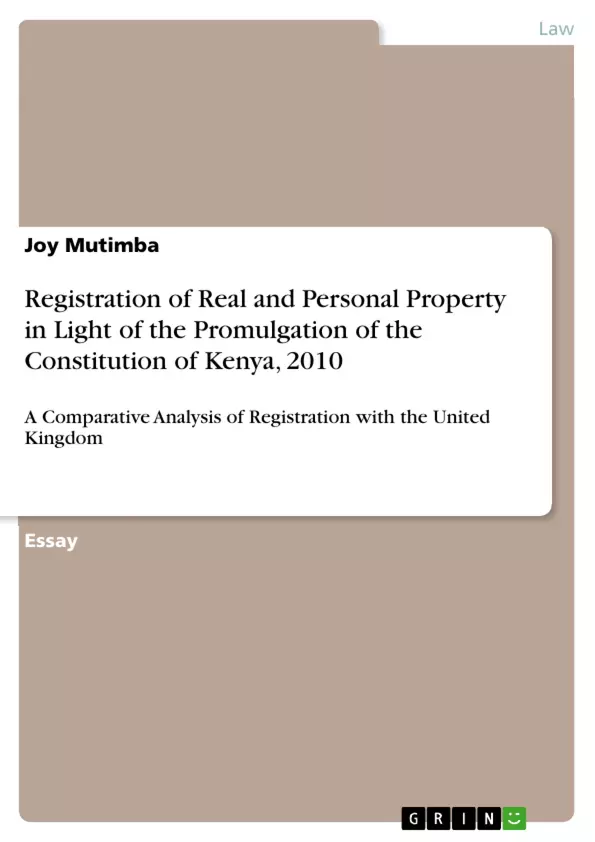The use of proprietary interests as a way of securing performance of obligations is a major part of financial transactions and the provision of security promotes economic growth by enabling access to finance. Given the importance of security to a country in achieving economic growth, it is important for a country to have modern laws governing the use of proprietary interests as protection against credit risk.
The promulgation of the Kenyan constitution in 2010 facilitated the repeal of old laws and the coming about of new proprietary and security laws. The Kenyan Parliament passed three bills into law in respect to real property on the 2nd day of May 2012, being the National Land Commission Act, the Land registration Act and the Land Act. These Acts repealed a number of statutes that had been in existence as far back as 1899. The Land Act gives effect to Article 68 (The Constitution of Kenya, 2010) which generally requires Parliament to revise, consolidate and rationalize the land laws in Kenya.
The aim of having these new laws was to create a sound investment climate that would provide sound legal and regulatory framework for enterprises and undertakings and improve access to key financial and infrastructure services.
We shall concentrate on the aforementioned laws and the registration of the various interests in property under the said regimes.
Inhaltsverzeichnis (Table of Contents)
- Introduction
- Registration in Kenya
- Registration of real property
- Registration of encumbrances
- Registration of personal property
- Registration of personal or movable property under the Movable Credit and Securities Act
- Registration of movable security under the Companies Act
- Analysis
- Analysis on security interests
- Registration in England
- Real property
- Registration of Personal Property
- Analysis
Zielsetzung und Themenschwerpunkte (Objectives and Key Themes)
This text aims to analyze the registration of real and personal property in Kenya in light of the 2010 Constitution, and compares the process with similar registration practices in the United Kingdom. The focus is on understanding the impact of new legislation on securing performance of obligations, fostering economic growth, and providing a stable legal framework for financial transactions.
- Impact of the Kenyan Constitution on property registration
- Comparative analysis of property registration in Kenya and the UK
- Legal framework and regulatory environment for property transactions
- Role of property registration in securing financial obligations
- Relationship between property registration and economic development
Zusammenfassung der Kapitel (Chapter Summaries)
The introduction establishes the importance of secure property interests in promoting economic growth and highlights the impact of the Kenyan Constitution on the legal framework governing property rights. It outlines the key legislation introduced in 2012 concerning real property and personal property.
The section on "Registration in Kenya" focuses on real property, discussing the definition of land in the Kenyan Constitution and outlining the process of land transfer. It emphasizes the importance of land identification, search procedures, and encumbrances on property titles. It also delves into the requirements for sale agreements, transfer documents, and stamp duty payment.
The section on "Registration of personal property" explores the registration procedures under the Movable Credit and Securities Act and the Companies Act. It outlines the key provisions of these acts and how they regulate the registration of personal property as security for financial obligations.
The "Analysis" section provides a comparative overview of security interests in Kenya and England, examining the similarities and differences in legal approaches to property registration and its role in safeguarding financial transactions.
Schlüsselwörter (Keywords)
The text focuses on key concepts such as property registration, real property, personal property, security interests, economic growth, legal framework, regulatory environment, financial transactions, and comparative analysis of legal systems. It examines the impact of the Kenyan Constitution and new legislation on property rights and their implications for the Kenyan economy.
- Citation du texte
- Joy Mutimba (Auteur), 2017, Registration of Real and Personal Property in Light of the Promulgation of the Constitution of Kenya, 2010, Munich, GRIN Verlag, https://www.grin.com/document/420578



